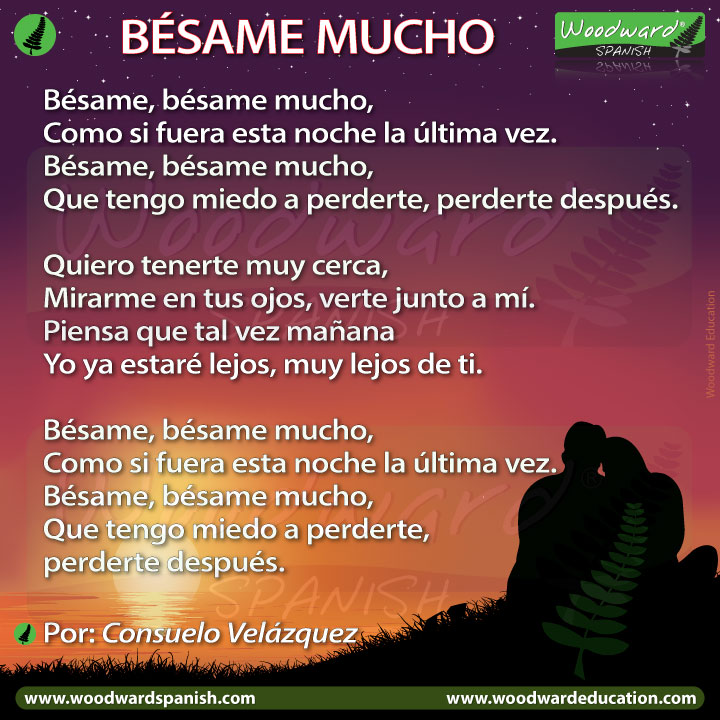
Bésame Mucho Lyrics in Spanish and English.
Bésame mucho is one of the most well known songs sung in Spanish – well, probably after Despacito nowadays. 🙂
It was written by the Mexican pianist and songwriter Consuelo Velázquez in 1932 when she was only 16 years old (and before her first kiss) wasn’t performed in front of an audience until 1940.
There have been many versions of Bésame mucho (including by The Beatles) and it is considered one of the most important songs in the history of Latin music.
Below are the original lyrics along with its English translation:
Bésame mucho in Spanish
Bésame, bésame mucho,
Como si fuera esta noche la última vez.
Bésame, bésame mucho,
Que tengo miedo a perderte, perderte después.
Quiero tenerte muy cerca,
Mirarme en tus ojos, verte junto a mí.
Piensa que tal vez mañana
Yo ya estaré lejos, muy lejos de ti.
Bésame, bésame mucho,
Como si fuera esta noche la última vez.
Bésame, bésame mucho,
Que tengo miedo a perderte, perderte después.
English Translation of Bésame mucho
Kiss me, kiss me a lot,
As if tonight were the last time.
Kiss me, kiss me a lot,
I’m afraid of losing you, of losing you later.
I want to have you very close,
See myself in your eyes, see you next to me.
Think that maybe tomorrow
I’ll already be far, very far away from you.
Kiss me, kiss me a lot,
As if tonight were the last time.
Kiss me, kiss me a lot,
I’m afraid of losing you, of losing you later.
Additional Language Notes about this Song
Besar = To Kiss – This is the infinitive before you change its form (conjugate).
Bésame = Kiss me
Here we are using the imperative – for giving orders or instructions. The accent is on the first syllable which is why the tilde (accent mark) is there … BÉS-a-me.
Como si fuera… = As if it were…
Here we are using the subjunctive FUERA – An example of the subjective in English is If I were you (and not if I was you). Yes, the subjunctive exists in English, though not many people know about it. In this case it refers to a hypothetical situation, not a real one.
La última vez = the last time
La primera vez = the first time
Tal vez = maybe / perhaps
Tengo miedo = I am scared / I am afraid
In Spanish, the verb tener (normally meaning to have) is used to say You are (or someone else is) afraid or scared.
Tener + miedo = To be scared / afraid
- Ella tiene miedo = She is scared.
Did you know?
This song appeared in the Disney live-action and animated movie The Three Caballeros (Los tres caballeros) in 1944.
